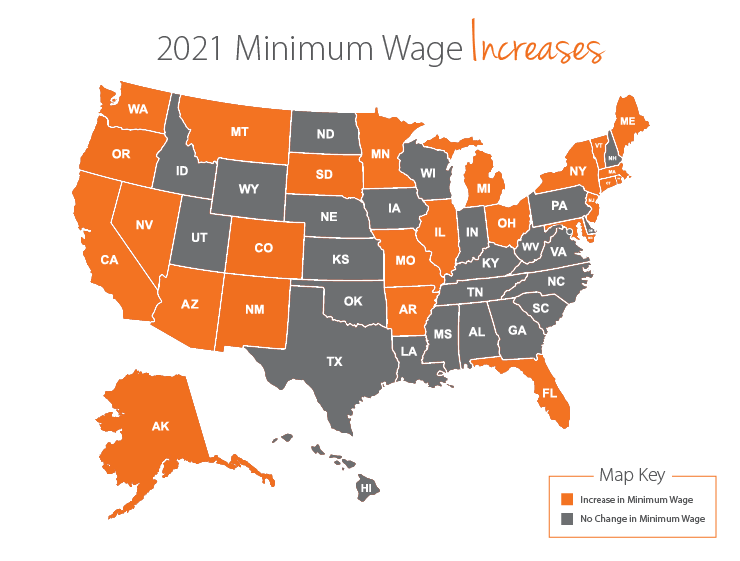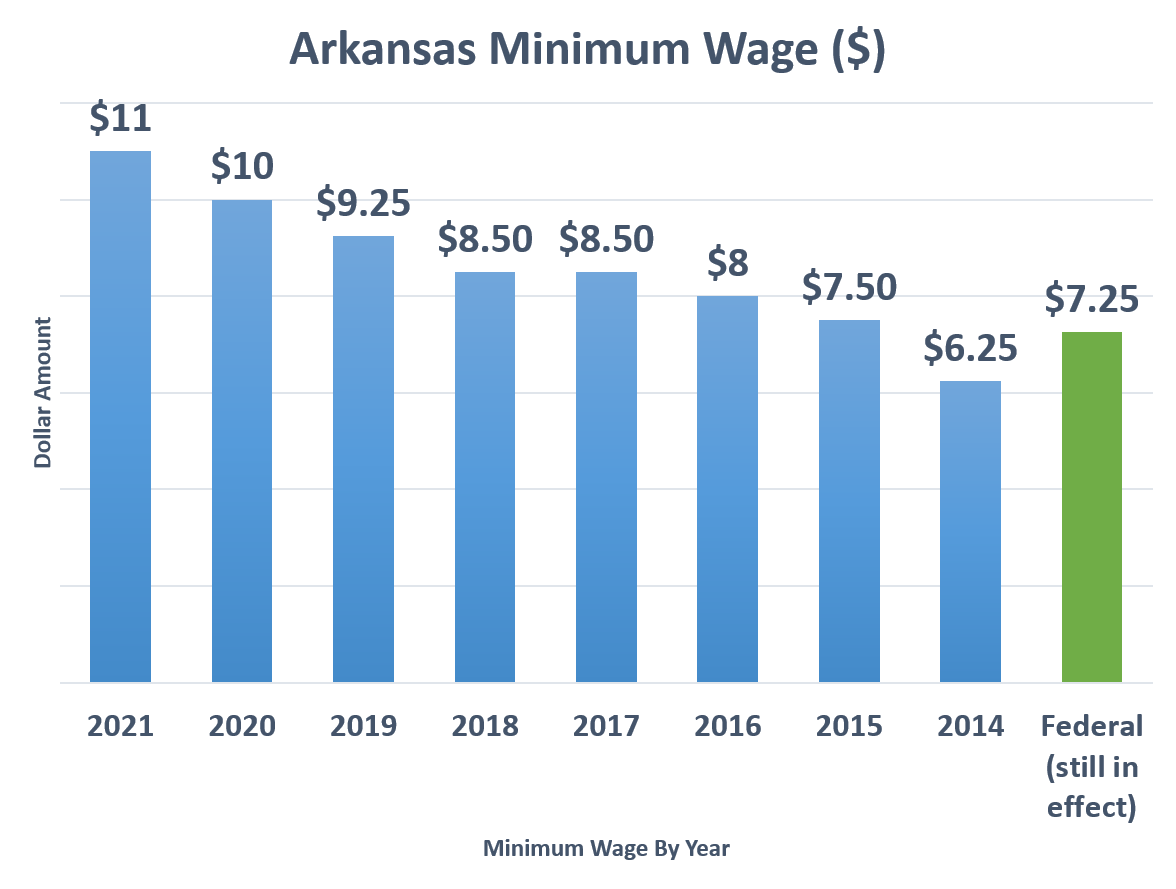December
Contact
Kristin Higgins
Public Policy Center
Email: khiggins@uada.edu
University of Arkansas System Division of Agriculture
Cooperative Extension Service
2301 S. University Avenue
Little Rock, AR 72204
Last of Arkansas Minimum Wage Increases Takes Place Jan. 1, 2021
The last in a series of voter-approved minimum wage increases will take effect Jan. 1, 2021 in Arkansas, raising the state's minimum hourly wage from $10 to $11 per hour.
Arkansas is one of 25 states where increases to the minimum wage will take place in 2021. Several states tie their minimum wage to inflation and have mandatory increases, while others such as Arkansas' are the result of a ballot issue.
 map source: Paycor
map source: Paycor
A full-time worker earning Arkansas' new hourly rate would make $22,880 a year before taxes, less than half the average earnings per job in Arkansas. But in a span of a decade Arkansas' minimum hourly wage has increased by $4.75 through the citizen initiative process.
Arkansas Minimum Wage Through The Years
Arkansas lawmakers approved an increase to the state's minimum wage in 2006, from $5.15 per hour to $6.25 per hour. Months later, the federal minimum wage increased from $5.15 to $5.85. (The Federal Minimum Wage Act of 2007 stepped up the federal wage eventually to $6.55 in 2008 and $7.25 in 2009.)
Arkansas' minimum hourly rate remained unchanged until 2015, when the first in a series of voter-approved increases took effect.
Arkansas voters in November 2014 approved a state law increasing the minimum wage from $6.25 per hour to $8.50 per hour over three years between 2015-2017.
The minimum wage act was placed on the statewide ballot through the citizen initiative process, which means a ballot issue group collected thousands of voter signatures across the state to qualify the proposal for the statewide ballot.
Arkansas voters in November 2018 again approved another citizen initiative ballot measure, increasing the hourly minimum wage from $8.50 per hour to $11 per hour by 2021. Voters approved that ballot issue by a vote of 605,784 to 279,046.
Meanwhile, the federal minimum wage meanwhile remains $7.25 per hour. States surrounding Arkansas, except for Missouri, follow the federal minimum wage. Missouri's minimum wage will also increase in 2021, from $9.45 to $10.30.

Federal Minimum Wage Earners Decreasing
The number of people in the United States earning the federal minimum wage or less has decreased. According to the Bureau of Labor Statistics, 392,000 workers earned the federal minimum wage in 2019 compared to 542,000 in 2017.
About 1.3 million workers had wages below the federal rate in 2019. Combined, those 1.2 million workers made up 1.9% of all hourly paid workers. (Working 40 hours a week at the federal minimum wage would earn someone $15,080 a year before taxes.)
Arkansas' minimum wage requirements apply to employers with four our more employees in industries that are not exempt by state law. For example, some agricultural activities and newspapers with a small circulation are exempt from minimum wage rate requirements. Also, allowances are made for gratuities (tips) to be part of the hourly minimum wage rate for occupations in which gratuities are customary.
Arkansas' tip law did not change. Arkansas' Department of Labor says tipped employees "must be paid at least $2.63 per hour. The tips they earn must be enough to bring them up to the applicable minimum wage per hour." Read more information about the minimum wage from the Department of Labor
Average Earnings and Median Income in Arkansas
The 2019 Rural Profile of Arkansas, published by the Community, Professional and Economic Development unit, noted a 3.6% increase in the average earnings per job in Arkansas from 2010 to 2016.
The average earnings per job in Arkansas in 2016 was approximately 78% of the national average, $45,217 in Arkansas compared to $58,372 nationwide.
At the same time, however, the state saw its median household income decline 2% from 2006-2010 to 2012-2016. The median household income in Arkansas was $42,336 in 2016, which was approximately 77% of the median household income in the nation.